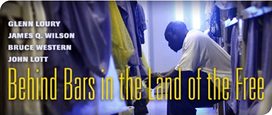Prison isn’t cheap, but the alternative of not having it is much more expensive. Western’s argument is that crime is high despite the level punishment and so obviously prison doesn’t matter. What he doesn’t seem to acknowledge is that things can be much worse. A city with a murder rate of 25 per 100,000 people can find itself with a murder rate of 50. By the way, if Western is interested, my book More Guns, Less Crime actually shows that the deterrent effect of the legal system is greatest in the high-crime urban areas.
Despite Western’s comments, both retribution and anger can be rationally based. Values can exist for a reason.
Here are some of the points on which there haven’t been responses from Loury and Western.
– When one looks at the total penalty system, criminal penalties are extremely progressive. Western has now raised the importance of reputational penalties, but he won’t discuss or recognize what that implies for the progressivity of overall penalties. Fines and restitution are also much higher for higher-income criminals. If overall penalties are extremely progressive as the reputational data suggests, it must be dealt with in any discussion of “fairness.”
– Everyone agrees that there is a serious tragedy of black committing crimes at high rates and that that crime is overwhelmingly committed against black victims. The notion that a Rawlsean “veil of ignorance” argument would imply special treatment for black criminals doesn’t fly if we also care about black victims.
– The mislabeled “unexplained prison gap” raised by Western is more consistent with a system that is racist against whites than blacks, though that the penalty system appears to be becoming less racist against whites over time.
– Except for saying that I have somehow misinterpreted his book, Loury offers no alternative explanation for what he meant when he asked if we should “apportion blame and affix responsibility for the cultural and social pathologies evident in some quarters of our society.” When I read this in connection with setting penalties it suggests to me that blacks should face lower penalties than whites for the same crime. Loury disagrees but offers no alternative suggestion for what he meant.
References
Lott, John R., Jr., More Guns, Less Crime: Analyzing Crime and Gun Control Laws, Second edition. University of Chicago Press: Chicago, Illinois (2000).

